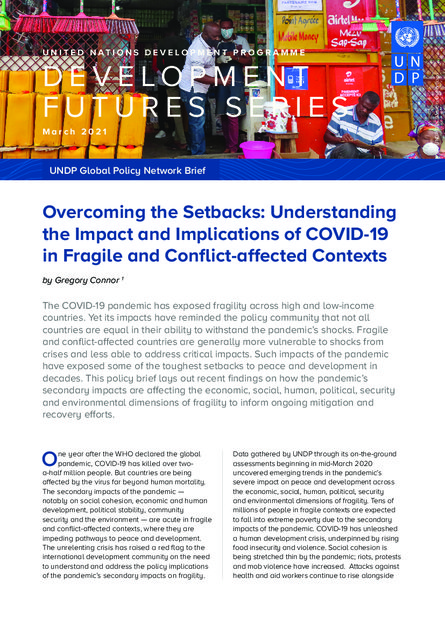
The COVID-19 pandemic has exposed fragility across high and low-income countries. Yet its impacts have reminded the policy community that not all countries are equal in their ability to withstand the pandemic’s shocks. Fragile and conflict-affected countries are generally more vulnerable to shocks from crises and less able to address critical impacts. Such impacts of the pandemic have exposed some of the toughest setbacks to peace and development in decades. This policy brief lays out recent findings on how the pandemic’s secondary impacts are affecting the economic, social, human, political, security and environmental dimensions of fragility to inform ongoing mitigation and recovery efforts.
Data gathered by UNDP through its on-the-ground assessments beginning in mid-March 2020 uncovered emerging trends in the pandemic’s severe impact on peace and development across the economic, social, human, political, security and environmental dimensions of fragility. Tens of millions of people in fragile contexts are expected to fall into extreme poverty due to the secondary impacts of the pandemic. COVID-19 has unleashed a human development crisis, underpinned by rising food insecurity and violence. Social cohesion is being stretched thin by the pandemic; riots, protests and mob violence have increased. Attacks against health and aid workers continue to rise alongside the pandemic, raising concern that violence might accompany vaccine rollout and that fragile and conflict-affected contexts may be left behind, again.
This Policy Brief is a synthesis of findings from a UNDP paper, Understanding the impacts of the COVID-19 pandemic on peace and development in fragile and conflict-affected contexts, which draws on primary source data, including from UNDP’s Socio-economic Impact Assessments, United Nations Socio-economic Recovery Plans, and results-based reporting from UNDP’s presence in all 57 fragile and conflict-affected contexts included in the Organisation for Economic Cooperation and Development’s 2020 States of Fragility Report.